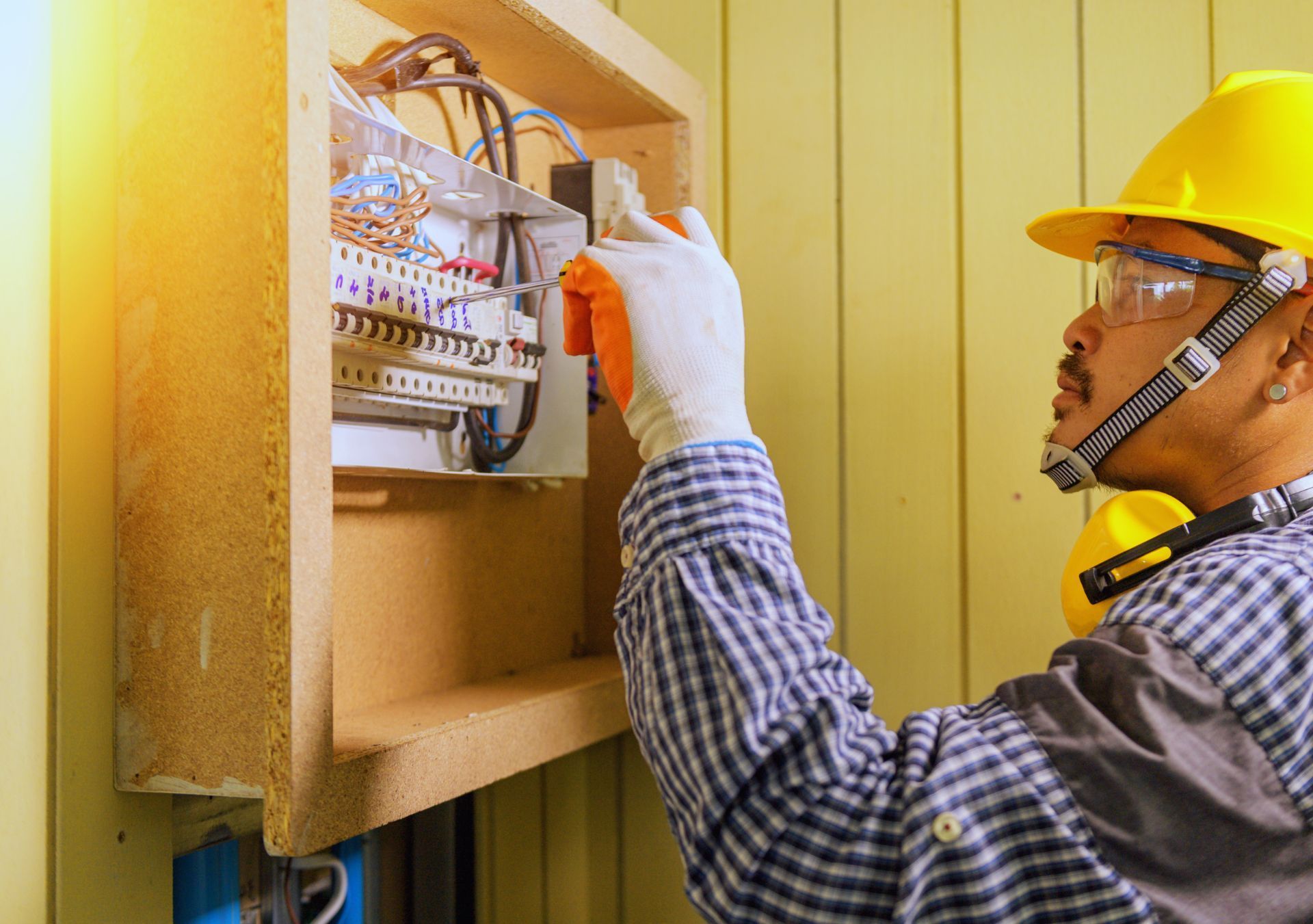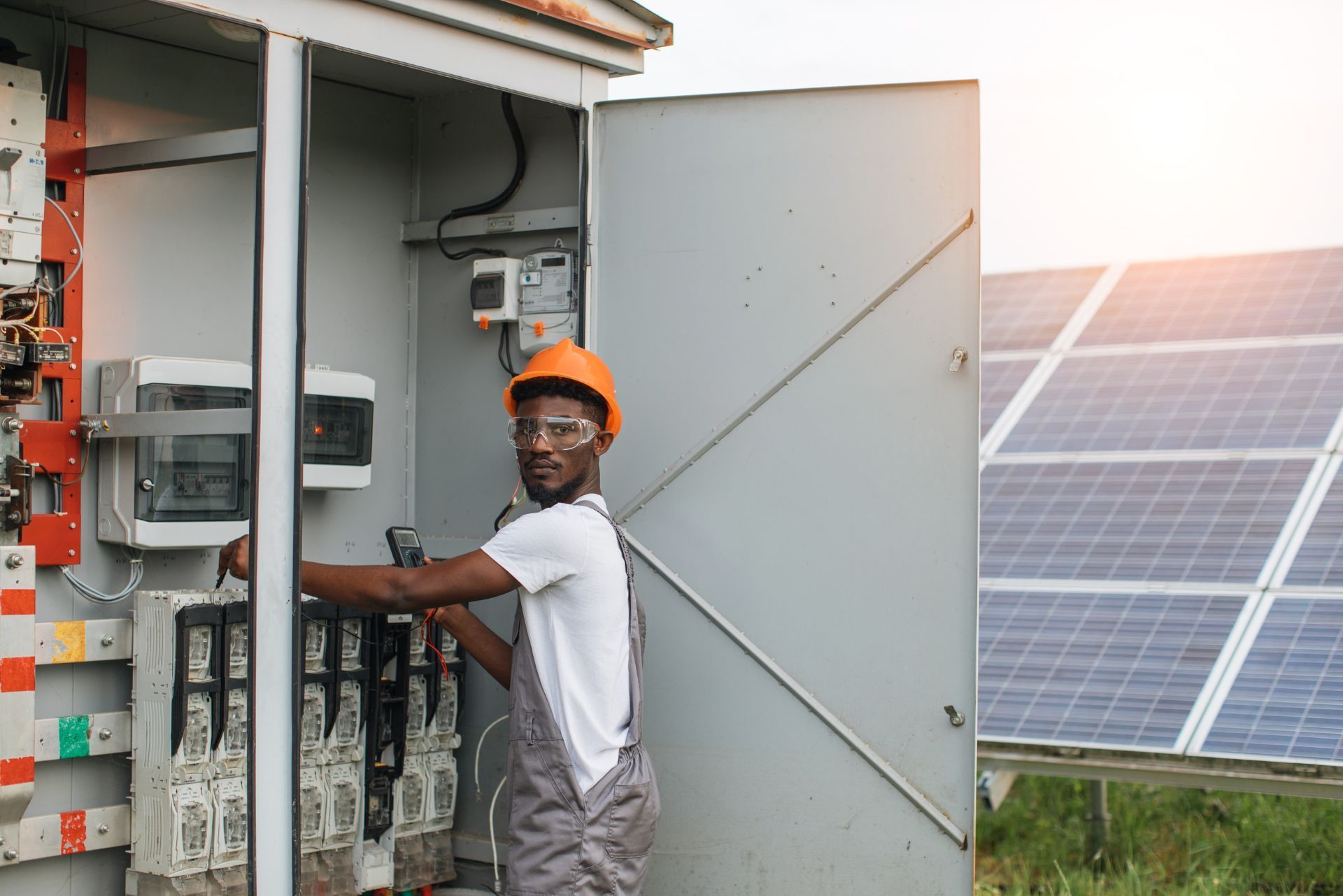Arizona Low Voltage Electrician Insurance
See How We're Different:
or Call Us:(480) 526-3222

Most Common Business Policies
Index
The Growing Demand for Low Voltage Electricians in Arizona
Why Insurance Coverage is Essential for Low Voltage Electricians
Types of Coverage for Arizona Low Voltage Electricians
Understanding Arizona’s Unique Market Conditions
How to Choose the Right Insurance for Your Low Voltage Electrical Business
Cost Factors and Salary Considerations
Contact Us
Low voltage electricians play a crucial role in Arizona’s expanding electrical industry, handling specialized systems that power everything from security alarms to data networks. As demand for their expertise grows, understanding the right insurance coverage becomes essential for protecting these professionals and their businesses. This guide explores the unique insurance needs of low voltage electricians in Arizona, highlighting industry trends, salary insights, and the types of coverage that provide peace of mind in a competitive market.
Arizona’s electrician industry is projected to reach $5.5 billion in revenue by 2025, growing annually at 1.9% since 2020. This growth reflects a broader surge in
electrical work driven by population increases and infrastructure development, especially in the Phoenix-Mesa-Scottsdale metropolitan area, which has led the nation in electrician employment growth over recent years. For low voltage electricians, this means more job opportunities but also greater risks that make comprehensive insurance coverage a smart investment. For more details on the industry’s expansion, visit
IBISWorld’s Arizona Electricians Industry Report.
The Growing Demand for Low Voltage Electricians in Arizona
Arizona’s rapid urban development has fueled a steady increase in demand for electricians, with projections indicating a 10% growth in the profession by 2030. Population growth, especially in the Phoenix area, is a key driver behind this trend. The Phoenix-Mesa-Scottsdale metropolitan statistical area (MSA) added over 1,000 electricians between 2017 and 2022, the highest increase among U.S. metro areas.
Low voltage electricians, who specialize in systems such as telecommunications, fire alarms, and security installations, are increasingly vital as homes and businesses adopt more advanced technology. These systems require precise installation and maintenance, making the expertise of low voltage electricians indispensable. As smart home technologies become more prevalent, including automated lighting, climate control, and integrated security systems, the need for skilled professionals who can navigate the complexities of low voltage wiring and installation is more critical than ever. Moreover, as businesses seek to enhance their operational efficiency through advanced communication systems and energy management solutions, the role of low voltage electricians is expanding beyond traditional boundaries.
With the average annual salary for a low voltage electrician in Phoenix at approximately $49,946, or $24 per hour, the profession offers stable earning potential. However, this salary sits below the national average hourly wage for electricians, which was $32.60 as of May 2023, reflecting regional market differences and specialization levels. For more on salary trends, see Salary.com’s Low Voltage Electrician Salary Data. The demand for low voltage electricians is not only driven by new construction but also by the growing need for retrofitting existing buildings with modern technology. As older infrastructures are updated to meet current safety and efficiency standards, low voltage electricians will play a crucial role in ensuring these systems are installed correctly and function seamlessly. This trend is particularly evident in commercial spaces, where businesses are increasingly investing in upgraded security and communication systems to protect assets and enhance productivity.

Why Insurance Coverage is Essential for Low Voltage Electricians
Working with electrical systems, even low voltage ones, involves inherent risks. Mistakes or accidents can lead to property damage, injury, or costly service interruptions. Given the projected shortage of 462,000 electrical workers nationwide by 2040, the pressure on existing electricians to meet demand increases the likelihood of errors, making insurance coverage more critical than ever.
Low voltage electricians face unique challenges compared to general electricians. Their work often involves sensitive electronic equipment and complex wiring systems that require precision and care. Liability for damages or faulty installations can quickly escalate, underscoring the need for tailored insurance policies. Additionally, the rapid advancement in technology means that low voltage electricians must continuously update their skills and knowledge to stay current with industry standards, which can add to the complexity of their work and the potential for mistakes.
Key insurance types for low voltage electricians include general liability, professional liability (errors and omissions), workers’ compensation, and commercial auto insurance. These policies collectively protect against third-party claims, employee injuries, and vehicle-related incidents, which are common in the trade. Without adequate coverage, electricians risk significant financial exposure that could jeopardize their business. Furthermore, as projects become more intricate and involve multiple stakeholders, the potential for disputes increases, making professional liability insurance particularly vital. This type of coverage not only protects against claims of negligence but also helps cover legal fees, which can be exorbitant in the event of a lawsuit.
Moreover, the nature of low voltage work often requires electricians to collaborate with other trades, such as HVAC technicians and IT specialists, which can introduce additional layers of risk. For instance, if a low voltage electrician inadvertently damages a piece of critical equipment during installation, the resulting costs could be substantial. Having comprehensive insurance allows electricians to not only safeguard their financial interests but also to foster trust and credibility with clients and partners. In an industry where reputation is paramount, being adequately insured can serve as a competitive advantage, reassuring clients that they are working with a responsible and professional contractor.
Types of Coverage for Arizona Low Voltage Electricians
General Liability Insurance
This coverage protects electricians from claims related to bodily injury or property damage caused during their work. For example, if a low voltage electrician accidentally damages a client’s expensive equipment or causes a minor fire, general liability insurance covers legal fees and settlements.
Given the high stakes of electrical work, general liability is often considered the foundation of any electrician’s insurance portfolio. It not only safeguards the electrician’s financial stability but also enhances their credibility with clients. Many customers prefer to hire electricians who are insured, as it demonstrates professionalism and a commitment to responsible business practices. Additionally, having this coverage can help electricians secure contracts, as some clients may require proof of insurance before proceeding with a project.
Professional Liability Insurance
Also known as errors and omissions insurance, this policy covers claims arising from mistakes, negligence, or failure to perform professional duties. Low voltage electricians who design or install complex systems benefit from this coverage, as it protects against costly lawsuits related to faulty workmanship or design flaws.
This type of insurance is especially crucial in an industry where technology is constantly evolving. As low voltage systems become more sophisticated, the potential for errors increases. For instance, if an electrician miscalculates the specifications for a security system installation, it could lead to significant financial losses for the client. Professional liability insurance not only covers legal costs but also provides peace of mind, allowing electricians to focus on delivering high-quality work without the looming fear of potential litigation.
Workers’ Compensation Insurance
Electrical work involves physical labor and exposure to hazards like electrical shocks or falls. Workers’ compensation insurance is mandatory in Arizona for businesses with employees and covers medical expenses and lost wages if an electrician is injured on the job.
Moreover, this insurance fosters a safer work environment by encouraging employers to prioritize safety protocols and training. When electricians know they are covered in the event of an accident, they may be more inclined to report unsafe conditions or injuries, ultimately leading to improved workplace safety. This proactive approach not only protects the employees but also enhances the overall reputation of the business, making it more attractive to potential clients and skilled workers alike.
Commercial Auto Insurance
Many low voltage electricians use vehicles to transport tools and equipment. Commercial auto insurance protects against accidents or damages involving work vehicles, which personal auto policies typically exclude.
In addition to covering damages from accidents, this insurance also provides liability coverage in case the electrician is found at fault for an accident while driving a work vehicle. This is particularly important given the nature of the work, which often requires transporting heavy and expensive equipment. Furthermore, some policies may offer coverage for tools and equipment stored in the vehicle, adding another layer of protection for electricians who rely on their vehicles for daily operations.
Equipment Coverage
Specialized tools and equipment used by low voltage electricians represent a significant investment. Equipment coverage insures against theft, loss, or damage, ensuring business continuity in case of unexpected events.
This coverage is essential for electricians who often work on multiple job sites, where the risk of theft or damage can be higher. For instance, if a technician's tools are stolen from a job site, the financial burden of replacing them can be crippling, especially for small businesses. Equipment coverage not only mitigates these risks but also allows electricians to invest in the latest technology and tools, which can enhance their service offerings and efficiency. Additionally, some policies may cover rental equipment, ensuring that electricians can continue working even if their own tools are temporarily unavailable.
Understanding Arizona’s Unique Market Conditions
Arizona’s electrical industry faces several market-specific factors that influence insurance needs. For instance, the average monthly energy bill in Phoenix is $136, notably higher than the national average. This elevates the importance of energy-efficient installations and maintenance, areas where low voltage electricians often contribute significantly. The push for sustainable energy solutions has led to an increased demand for solar panel installations, further complicating the insurance landscape as electricians must navigate the unique risks associated with renewable energy systems.
Additionally, the Phoenix-Mesa-Scottsdale MSA’s rapid growth means electricians frequently work on new construction and retrofit projects, which carry different risks compared to routine maintenance. As urban development expands, electricians are often called to adapt existing electrical systems to meet modern standards and codes, which can involve intricate planning and execution. Insurance policies should reflect these nuances to provide adequate protection, ensuring that electricians are covered for potential liabilities that arise from both new installations and complex renovations.
With the U.S. electrical workforce growing from about 656,000 in 2018 to nearly 713,000 in 2023, competition is increasing. Electricians who invest in comprehensive coverage demonstrate professionalism and reliability, which can be a competitive advantage in winning contracts. This trend is particularly evident in Arizona, where the influx of new residents has led to a surge in demand for electrical services, creating opportunities for skilled electricians to establish themselves in a crowded market. Moreover, as technology continues to evolve, electricians must stay informed about the latest tools and techniques, which can further enhance their marketability and the necessity for robust insurance coverage.
More detailed insights on employment trends are available from
Electrical Marketing’s Industry Statistics. Understanding these dynamics not only aids electricians in navigating their insurance needs but also equips them with the knowledge to better serve their clients, ensuring that they remain competitive in an ever-evolving industry.

How to Choose the Right Insurance for Your Low Voltage Electrical Business
Selecting the right insurance coverage requires assessing your specific risks, business size, and client base. Here are some practical steps:
- Evaluate Your Risks: Consider the types of projects you handle and potential liabilities. For example, if you install security systems in commercial buildings, professional liability is critical.
- Understand State Requirements: Arizona mandates workers’ compensation for businesses with employees. Ensure compliance to avoid penalties.
- Compare Policies: Look for policies that offer flexible coverage limits and include endorsements relevant to low voltage work.
- Work with Experienced Providers: Insurance companies familiar with the electrical trade can tailor coverage to your needs and offer risk management advice.
- Review Annually: As your business grows or changes, update your coverage to reflect new risks or assets.
Investing time in selecting the right insurance safeguards your livelihood and builds trust with clients who expect professionalism and accountability.
Cost Factors and Salary Considerations
Insurance premiums for low voltage electricians vary based on several factors including business size, claims history, and coverage limits. While the average annual salary for a low voltage electrician in Phoenix is just under $50,000, the cost of insurance is a necessary business expense that protects this income stream.
Comparing this to the national average hourly pay for electricians at $32.60, low voltage specialists in Arizona may find insurance costs relatively affordable given their earning potential and the high demand for their skills. Balancing cost and coverage quality is key to maintaining profitability.
Energy Efficiency and Its Impact on Electrical Services
With Phoenix residents facing higher-than-average energy bills, there is growing demand for energy-efficient electrical solutions. Low voltage electricians often install systems that optimize energy use, such as smart lighting and automated controls.
This trend not only expands business opportunities but also introduces new liability considerations. Ensuring that installations meet energy codes and function correctly is vital, making professional liability insurance even more important.
Learn more about energy efficiency trends in Phoenix at
Phoenix Electricians Today.
Frequently Asked Questions
Q: What insurance is legally required for low voltage electricians in Arizona?
A: Workers’ compensation insurance is required if you have employees. Other coverages like general liability are not legally mandatory but highly recommended.
Q: How does professional liability insurance differ from general liability?
A: General liability covers physical injury or property damage, while professional liability protects against claims of errors or negligence in your work.
Q: Can I get coverage for my specialized tools and equipment?
A: Yes, equipment coverage or inland marine insurance can protect your tools from theft, loss, or damage.
Q: How often should I review my insurance policies?
A: Review your coverage annually or whenever your business changes significantly to ensure adequate protection.
Q: Does insurance cover work done on new construction differently?
A: Some policies offer specific endorsements for new construction risks, so it’s important to discuss your project types with your insurer.
Q: How can insurance help with client trust?
A: Having comprehensive insurance demonstrates professionalism and financial responsibility, making clients more confident in hiring you.
Before You Go
Low voltage electricians in Arizona operate in a dynamic and growing market that demands both technical skill and business savvy. Insurance coverage tailored to this niche protects against the unique risks of the trade and supports long-term success. By understanding the types of coverage available and the specific market conditions in Arizona, electricians can make informed decisions that safeguard their work and livelihood.
As the industry continues to expand, staying current on insurance trends and maintaining adequate coverage will remain essential. With the right protections in place, low voltage electricians can confidently meet the needs of Arizona’s thriving communities and evolving technology landscape.
